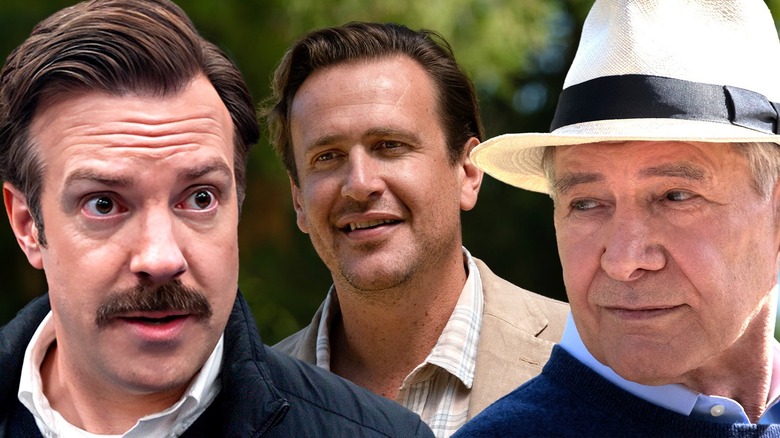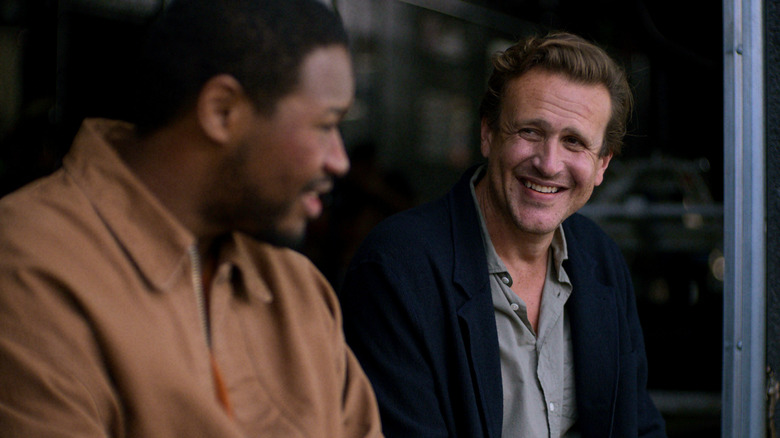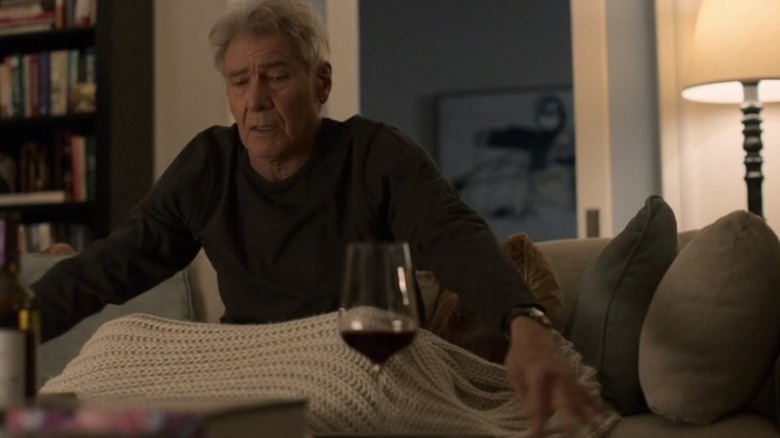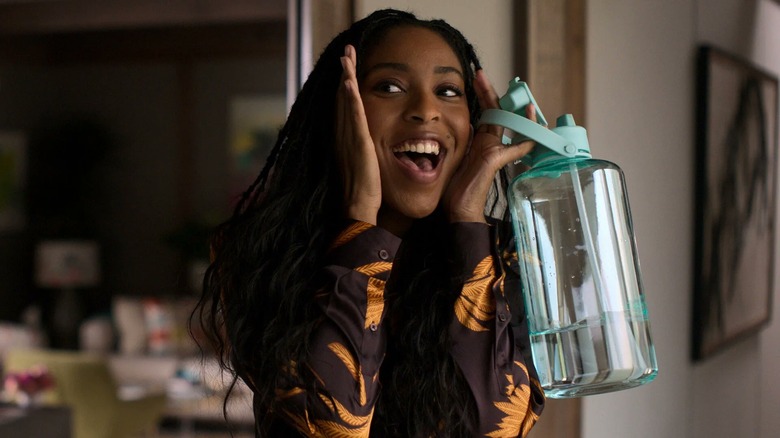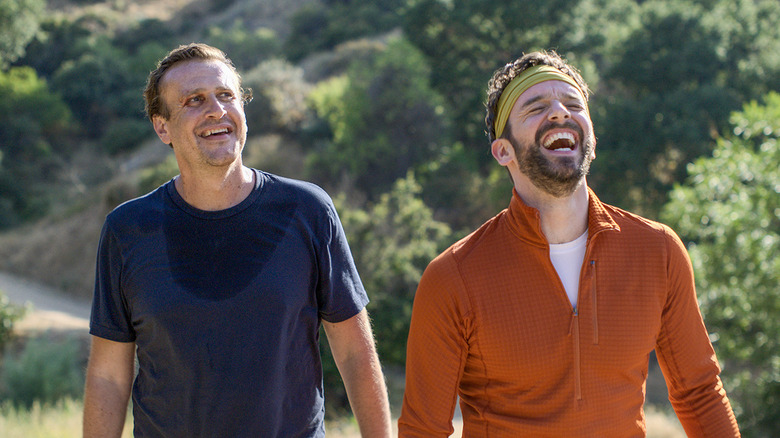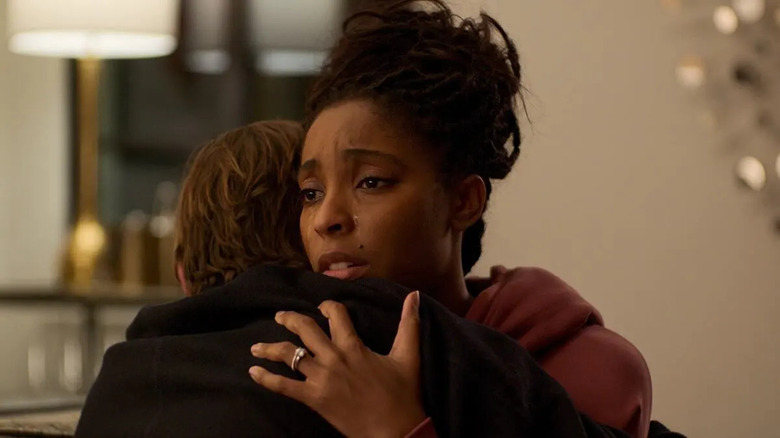Here's What Shrinking Does Better Than Most Prestige Shows On TV Right Now
There's never been a better time to be a fan of television. Streaming platforms have forced network television to step up their game, and the continued competition between said streamers has inspired some of the most creative approaches to both serialized and episodic entertainment. For a time, it used to be that prestige TV was reserved for the creator-driven tragic dramas of the 2000s and 2010s like "The Sopranos," "The Wire," "Lost," "Mad Men," "Breaking Bad," and "Deadwood." But now, prestige TV can encompass everything from the heartwarming adventures of "Only Murders in the Building" to the unflinching realness of "P-Valley."
It's an exciting evolution because the label of "prestige" is no longer solely relegated to shows about complicated men. Sometimes, like in the case of an edgy teen show like "Euphoria" or a cannibalism mystery thriller like "Yellowjackets," even high school girls can be at the center of must-watch TV. While the expanding landscape is exciting, it has also seemingly forced a lot of shows into boxes they did not ask for. "The White Lotus," for example, is a satirical dramedy about privileged people behaving badly who are unaware that they're all terrible, while "Succession" is a satirical dramedy about privileged people behaving badly who are very aware they're monsters and revel in it.
And then there's a show like "Shrinking," the latest series from TV juggernaut Bill Lawrence (as well as Jason Segel and Brett Goldstein) that feels unlike anything else currently available, and that includes his own show, "Ted Lasso." There's a refreshing balance on the Apple TV+ series, allowing the high-stakes drama of prestige TV to be just another day in the life of some broken people trying their best.
The anti-Ted Lasso and the anti-Succession
Bill Lawrence understands what it takes to make good TV, but his shows always feel fresh and unique from one another. My mom was a huge mark for "Spin City" back in the day and "Scrubs" remains one of my all-time comfort shows, but both series look and feel entirely different from "Cougar Town" or even "Ground Floor." But then came "Ted Lasso," a feel-good series that all of us miserable old dorks couldn't get enough of in 2020 when the world felt like it was crumbling all around us. (Let's be honest, it still is.) "Ted Lasso" was the perfect reminder that hope, empathy, and kindness can be powerful tools for radical change.
On the flip side, a show like "Succession" treats cruelty as its own form of currency, and we can't get enough of it. While the series debuted back in 2018, its popularity skyrocketed during the early days of the pandemic when folks were looking for new shows to watch while quarantined, and the fact it allowed so many of us who were struggling to watch wealthy elites decimate one another was just what the doctor ordered.
Of course, these are extremely simplistic assessments of both shows (and I love them both dearly), but Lawrence clearly knew what the expectations were like when promoting "Shrinking." He even described the show's protagonist, Jason Segel's Jimmy Laird, as the "anti-Ted Lasso." Most of us will never be as positive as Ted Lasso or as ruthless as Logan Roy, but I'll be the first to admit I'm as messy as Jimmy ... and probably as ornery as Paul Rhodes (Harrison Ford), even though I like to think I'm as upbeat as Gaby (Jessica Williams).
Everyone's a mess, just like you!
And that's the thing about "Shrinking" that's so exciting — all of the characters are equally as complicated and messy and wonderful. The show reels you in with Jimmy Laird's selfish, chaotic behavior, setting up those around him to look like a balanced, level-headed community of loved ones who are trying to help him get his life together. In reality, every single one of them has their own issues to deal with and is handling things just as poorly, just in different ways. At the start of "Shrinking," I wasn't sure how long I'd be able to handle watching a therapist cross every ethical line in the book, but the more I watched, the more I fell in love with this corny dad trying and failing to get it together.
Christa Miller, a frequent veteran of Lawrence's shows, is playing the character she was perhaps born to play, and that's saying something considering her turn as Jordan Sullivan on "Scrubs" is nothing short of brilliant. But as Liz, there's something so lived in about her that I can't help but love. In lesser hands, Liz would be nothing more than an annoying "Karen" type, but with Miller behind the wheel, she's an impressively layered maternal figure that isn't afraid to call out a racist neighbor or deliver a well-placed F-bomb.
And yes, grumpy Harrison Ford as Paul is as delightful as you'd expect, and seeing him demolish a bag of Doritos after too many edibles is the first time I've ever watched Ford and not thought to myself, "Holy s***, that's Han Solo/Indiana Jones." Instead, I chucked and thought, "Damn, he's just like me."
How do I convince you to watch Shrinking?
Because every character is deeply flawed and simultaneously bursting with wit and personality, "Shrinking" serves as a reminder that no human being should ever be defined by archetypal characteristics or singular moments. Jimmy screws up a lot in season 1 ... but so do Gaby, Paul, Liz, Jimmy's daughter Alice (Lukita Maxwell), his best friend Brian (Michael Urie), and just about all of the therapy patients, including Sean (Luke Tennie), the veteran with PTSD that Jimmy invites to live in his pool house, and especially Grace (Heidi Gardner) his patient in an abusive relationship. This isn't to say that the characters of shows like "Ted Lasso" or "Succession" don't have relatable attributes, because they absolutely do, but "Shrinking" ... it just hits differently, man.
Since this is a show about therapy, I guess I'll be a little vulnerable in admitting that I almost didn't write this piece. How do I write about a show that feels so deeply personal and resonates with me in my bones for the world at large to consume and do it justice? How do I effectively convey how this show tackles incredibly bleak subjects with such love and nuance that it makes the violently uncomfortable feel like a warm embrace? How do I properly sell a show that my own therapist and I now discuss in our sessions? Hell, how do I explain that there's a show currently on TV where the villain in "Revenge of the Nerds" plays the world's most endearing himbo wife guy?! (Ted McGinley, if you're reading this, you're incredible.)
I do my best, that's how.
We're all just idiots trying out best
"Shrinking" is a show about the unorthodox ways people process the s*** in their lives because there's no guidebook to any of this, and it's a series that allows people to make mistakes of all sizes. For a show that at its core is serialized, the fact that the conflicts and screw-ups are treated like a part of life and not exclusively reserved for shocking reveals provides the audience with the ease of an episodic series. I understand the criticisms lobbied at this show for its unethical presentation of therapy, but also, I think it's silly to be upset about a character's behavior that the show itself is not endorsing and is in fact, pretty vocal about saying is terrible, actually!
I've been in therapy for over two decades at this point so I know my way around the ol' "and how does it make you feel?" song and dance. Now, I'm no psychiatrist (I am a certified trauma-informed, social-emotional educator though!), but it wouldn't shock me if part of the reason so many people are uncomfortable with the premise of the show is that it forces us to recognize the truth that all of us, including clinically trained professionals, are still just idiots trying our best. Therapy is not a magic wand, it's work. It's painful, emotionally taxing, extremely difficult work, and yes, the people we pay for therapy each week are also dealing with their own hangups when they're not helping us unpack our intimacy issues or insecurities.
But at the same time, you also don't have to be a licensed therapist to be able to help the people in your life that you care about.
I wanna hear myself think again
"Shrinking" is a show that will have you laughing, cringing with nerves, and thrown into a crying frenzy all within the same 30 minutes. Why? Because that's how life works. We're all a bunch of complex balls of emotions and "Shrinking" wants us to feel every last one of them to remind us that we're human. There's a section of the theme song "Frightening Fishes," from Ben Gibbard (of Death Cab for Cuties fame) and Tom Howe (composer for "Ted Lasso," "The Great British Bake Off") that has been living rent-free in my brain since the pilot episode. It goes:
For so long, I've been turnin' into the skid
And waltzing away from the damage I did
I'd brush off my shoulders and tuck in my shirt
And flee from thе scene beforе I knew I'd been hurt
This verse, and this show, tap into a part of the audience that a lot of us struggle to acknowledge even exists, and does so by treating each character and all of their problems with the same gravity as a struggling English Premier League soccer team (sorry, Brits) or vying to take over a global media and entertainment conglomerate (and screwing over every member of your family in the process).
In real life, we are all our own worst enemies, and we're the ones constantly getting in our own way. Our sinking feelings, our self-doubt, and our insecurities are just as lethal as any sort of plotline of a prestige drama, and "Shrinking" thrives by not running from it or wrapping it up in some overarching metaphor.
It just is, and we just are, and that makes for some refreshingly compelling TV.
